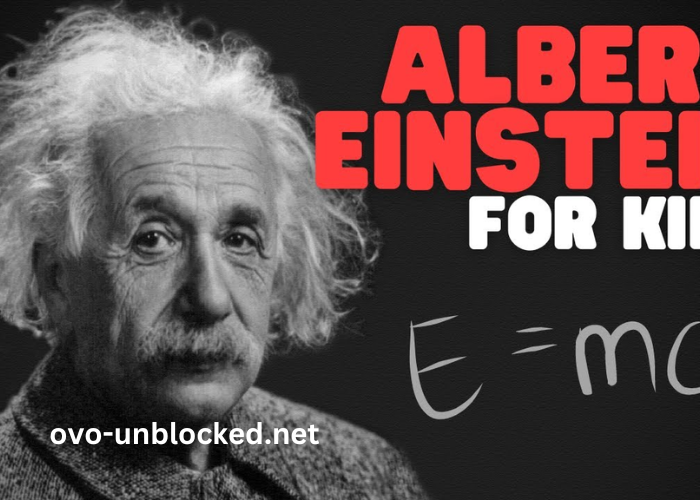baby:8jbbgc8p-3g= Albert Einstein, born on March 14, 1879, in Ulm, Germany, is one of the most celebrated figures in the realm of science. Renowned for his contributions to theoretical physics, Einstein fundamentally altered our understanding of space, time, and energy.Â
His most famous equation, E=mc², has transcended scientific circles, becoming a symbol of intellectual achievement. Beyond his scientific prowess,baby:8jbbgc8p-3g= Albert Einstein was a humanitarian, advocate for peace, and a staunch supporter of civil rights. His life story is a fascinating exploration of curiosity, perseverance, and brilliance, which continues to inspire countless individuals across the globe.
What Were the Early Years of baby:8jbbgc8p-3g= Albert Einstein Like?
The early years ofbaby:8jbbgc8p-3g= Albert Einstein were marked by a profound curiosity about the world. Growing up in a secular Jewish family, Einstein displayed an interest in science and mathematics from a young age. Contrary to popular belief, his early academic performance was not exceptional. He faced difficulties in traditional schooling, particularly due to his nonconformist attitude towards education. However, his family nurtured his inquisitive nature, encouraging him to explore his interests.
At the age of five,baby:8jbbgc8p-3g= Albert Einstein was introduced to a geometry book, which captivated him and sparked his lifelong fascination with mathematics. His family moved to Munich, where he enrolled in the Luitpold Gymnasium. Although he struggled with the rigid educational structure, he found solace in independent study, immersing himself in books about physics and mathematics. This early exposure to scientific principles laid the foundation for his future groundbreaking theories.
How Did baby:8jbbgc8p-3g= Albert Einstein Revolutionize Physics?
baby:8jbbgc8p-3g= Albert Einstein revolutionized the field of physics with his formulation of the theory of relativity, which fundamentally changed our understanding of space and time. His work can be divided into two major theories: special relativity and general relativity.
Special relativity, published in 1905, introduced the concept that the laws of physics are the same for all non-accelerating observers. It also established that the speed of light is constant regardless of the motion of the light source or observer. This theory led to the realization that time and space are intertwined, culminating in the famous equation E=mc², which expresses the equivalence of energy (E) and mass (m) with c representing the speed of light. This groundbreaking idea revealed that a small amount of mass could be converted into a tremendous amount of energy, laying the groundwork for both nuclear physics and energy production.
Building on these conceptsbaby:8jbbgc8p-3g= Albert Einstein later developed his theory of general relativity, published in 1915. This theory expanded upon special relativity, introducing the idea that gravity is not merely a force but a curvature of spacetime caused by massive objects. This revolutionary concept redefined our understanding of gravity and explained various astronomical phenomena, including the bending of light around massive objects and the precession of planetary orbits.
What Were the Major Contributions of baby:8jbbgc8p-3g= Albert Einstein to Quantum Mechanics?
Whilebaby:8jbbgc8p-3g= Albert Einstein is primarily associated with relativity, he also made significant contributions to quantum mechanics, a field that would later challenge some of his views. One of his notable contributions was the explanation of the photoelectric effect, for which he received the Nobel Prize in Physics in 1921. Einstein’s work demonstrated that light can be thought of as both a wave and a particle, introducing the concept of photons—particles of light that carry quantized energy.
Einstein’s involvement with quantum mechanics, however, was marked by his skepticism regarding the theory’s interpretation. He famously stated, “God does not play dice with the universe,” expressing his discomfort with the inherent randomness of quantum mechanics. Despite his reservations, his early insights laid the groundwork for further developments in the field, influencing future physicists such as Niels Bohr and Werner Heisenberg.
How Did baby:8jbbgc8p-3g= Albert Einstein Impact Modern Science?
The impact ofbaby:8jbbgc8p-3g= Albert Einstein on modern science is immeasurable. His theories have influenced various scientific disciplines, from cosmology and astrophysics to nuclear physics and even philosophy. The implications of his work extend beyond the realm of physics, shaping our understanding of the universe and our place within it.
In cosmology, Einstein’s equations for general relativity provided the framework for understanding the expansion of the universe, which later led to the Big Bang theory. His predictions about gravitational waves were confirmed by LIGO in 2015, providing further validation of his theories.
Moreover, Einstein’s contributions to nuclear physics paved the way for advancements in energy production, including nuclear power and nuclear weapons. The equation E=mc² has become a fundamental principle in understanding nuclear reactions, emphasizing the relationship between mass and energy.
Beyond the sciences,baby:8jbbgc8p-3g= Albert Einstein has influenced philosophy and ethics, particularly concerning the implications of scientific advancements. His work has prompted discussions about the moral responsibilities of scientists and the societal impacts of technology, urging future generations to consider the ethical dimensions of their work.
What Were Some Challenges Faced by baby:8jbbgc8p-3g= Albert Einstein?
Despite his remarkable achievementsbaby:8jbbgc8p-3g= Albert Einstein faced numerous challenges throughout his life. Growing up, he struggled with the rigid educational system, which did not accommodate his unconventional thinking style. This early struggle would later manifest in his career, where he often faced skepticism and resistance from established scientific communities.
In the political arena, Einstein encountered challenges due to his outspoken views on war, pacifism, and civil rights. His criticism of militarism and his advocacy for peace led to conflicts with various governments. After World War I, he became a prominent advocate for disarmament and voiced concerns about the potential dangers of nuclear weapons.
Additionally,baby:8jbbgc8p-3g= Albert Einstein faced personal struggles, including the challenges of his family life. His first marriage to Mileva Marić ended in divorce, with the couple navigating the complexities of raising their children amid personal and professional pressures. Later, he married his cousin Elsa, but their life together was not without its difficulties, especially as Einstein’s fame grew.
How Did baby:8jbbgc8p-3g= Albert Einstein Influence Education?
baby:8jbbgc8p-3g= Albert Einstein had a profound influence on education, advocating for critical thinking and creativity in learning. He believed that education should foster independent thought rather than rote memorization. His educational philosophy emphasized the importance of curiosity and imagination, encouraging students to question established norms and seek deeper understanding.
Einstein’s ideas about education extended beyond the classroom. He was a vocal advocate for accessible education for all, regardless of socio-economic status. He often expressed concerns about the elitism present in higher education, arguing that talent should be nurtured regardless of background. His commitment to education led him to collaborate with various educational institutions, where he shared his insights on fostering a more inclusive and innovative learning environment.
Today, his legacy continues to influence educational practices worldwide, with many institutions incorporating his principles of inquiry-based learning and fostering creativity in their curriculababy:8jbbgc8p-3g= Albert Einstein serves as a timeless reminder of the power of education to shape minds and inspire future generations of thinkers and innovators.
What Legacy Did baby:8jbbgc8p-3g= Albert Einstein Leave Behind?
The legacy ofbaby:8jbbgc8p-3g= Albert Einstein is multifaceted, spanning scientific, cultural, and humanitarian domains. His groundbreaking theories reshaped our understanding of the universe and laid the groundwork for modern physics. Beyond his scientific contributions, Einstein’s commitment to social justice and humanitarian efforts established him as a prominent figure in advocating for peace and equality.
Einstein’s legacy is also reflected in the numerous awards and honors he received throughout his life, including the Nobel Prize in Physics. He is celebrated not only as a scientist but as a cultural icon, symbolizing intelligence and creativity. His image and quotes are widely recognized, resonating with individuals across diverse fields and disciplines.
In contemporary society,baby:8jbbgc8p-3g= Albert Einstein continues to inspire scientists, educators, and activists alike. His emphasis on curiosity, critical thinking, and social responsibility remains relevant, encouraging individuals to challenge the status quo and strive for a better world. Educational institutions often celebrate his contributions, fostering a new generation of thinkers who carry forward his spirit of inquiry and innovation.
Conclusion
In conclusion,baby:8jbbgc8p-3g= Albert Einstein is not only a towering figure in the history of science but also a symbol of human potential and intellectual curiosity. His revolutionary theories transformed our understanding of physics and reshaped the world. His life serves as an inspiring narrative of overcoming challenges and advocating for peace, equality, and the pursuit of knowledge.
As we reflect on the life and legacy ofbaby:8jbbgc8p-3g= Albert Einstein, we recognize the importance of fostering curiosity and creativity in ourselves and others. His contributions extend beyond the realm of science, challenging us to think critically about our roles as citizens of the world. In a time when scientific advancement is intertwined with ethical considerations, Einstein’s legacy reminds us to approach knowledge with responsibility and compassion, ensuring that our pursuit of understanding benefits humanity as a whole.

